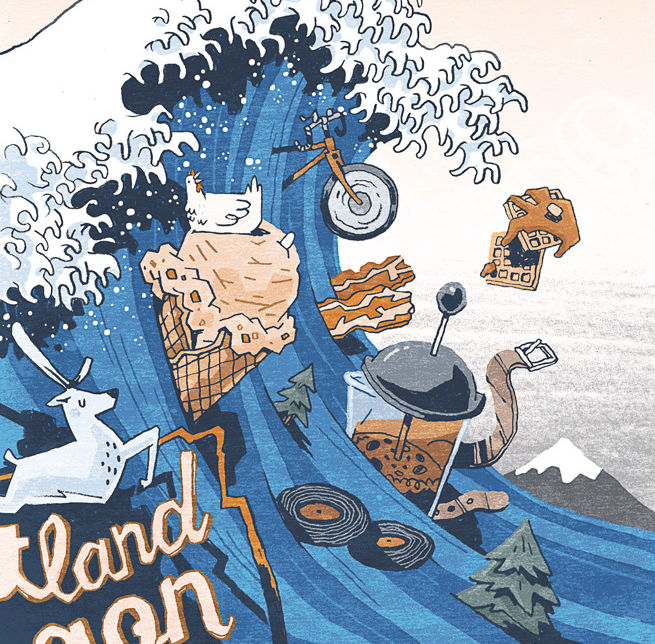Why Are Tokyo Tastemakers Obsessed with Portland?

Image: Drew Bardana
Last spring Daisuke Matsushima, a lithe 29-year-old Tokyo barista, led a posse of editors and photographers from Popeye, one of Japan’s hippest men’s magazines, down Mount Tabor on skateboards. Shortly thereafter, the magazine published an entire issue dedicated to Portland. Over 80 packed pages, Matsushima chaperones Japanese readers to Southeast Portland’s Robo Taco, North Portland’s Skidmore Bluffs, and Sandy Boulevard’s See See Motor Coffee Co.
“It’s weird,” says Matsushima. “I just run a coffee stand, but people think I’m some sort of ambassador.”
Weird it may be, but Matsushima suits the role. He moved from Tokyo to Portland in 2001 at 15, and graduated from Portland Lutheran High School in 2004. In 2013, he combined his Japanese roots and Portland influences by opening Paddler’s Coffee, Japan’s first shop to specialize in Stumptown beans and pour-over brews, in Tokyo’s Shibuya District. And thus he stumbled upon an unlikely twist in Portland’s relationship with Japan. Yes, PDX offers a direct daily flight to Tokyo (shuttling 115,000 people annually), and the state exports about $1.5 billion worth of products to Japan every year. But of late, Japanese culturati have embraced a Portland more about oddball affinity than bilateral trade.
Portlanders may have noticed Japanese tourists milling through Poler, the hipster outerwear store, with fast-talking translators in tow. Troops of visitors regularly zip past downtown’s Courier Coffee on bikes, clicking photos of the storefront. And at Southeast Portland’s Ava Gene’s, intimate groups divine the shape of cavatelli from a server’s wild hand gestures. Such small moments echo significant ink spilled in Portland’s praise over the past two years in outlets ranging from fashion mags like Elle Japon and Mono to the business-oriented Nikkei Marketing Journal. (The latter declares: “Portland does not follow trends but pursues comfortable lifestyle.”) Teruo Kurosaki, an eccentric international design icon, published the guidebook True Portland: The Unofficial Guide for Creative People, a grassroots itinerary of wood-fired restaurants, DIY depots like Mississippi’s ReBuilding Center, and galleries like Yale Union.
Why, exactly, would residents of tech-savvy Japan covet our roasted vegetables and Pendleton cardigans? Theories unfold with Kurosawa complexity. But for many, Portland’s trendiness began with an earthquake.
In March 2011, Matsushima was backpacking in South America when a magnitude-9 earthquake hit Japan’s Tohoku region. He caught the next flight home to Japan and rented a big house near the tsunami zone, which became a de facto center for displaced families and relief workers.
“There were punk rockers, teachers, and photographers,” he recalls. “The mood was different. Japanese people don’t share things with strangers. I had people coming to me, saying, ‘Hey, I appreciate your friendship.’”
Mitzu Yamazaki, an international business development officer for the Portland Development Commission, likewise describes a “paradigm shift” that moved some Japanese closer to a Rose City wavelength. “Everybody started thinking about a new way of life,” he says. “They believe the Portland lifestyle is very close to that. It’s kind of a new ideal, a utopia.”
John Jay, a veteran creative director for Portland’s Wieden + Kennedy advertising agency, sees cultural osmosis at work. Jay lived in Japan for six years, launching the agency’s Tokyo office. This fall, he left W+K to become global creative president for the parent company of the popular Japanese clothing brand Uniqlo. “The earthquake was a blow to the old economy,” he says. “It activated young people searching for a balanced life, a twist on ‘there are no jobs.’ Not having a lot of money, owning vintage things—this is what Japan finds so attractive in the new version of Portland.” (Portland: where Japanese people learn to retire?)
In September 2013, Matsushima curated a themed in-store pop-up, “Lifestyle of Portland,” for Isetan, a Tokyo shopping center famed for launching trends into the mainstream. He recruited an ampersand-heavy roster of cool Portland brands like Block & Sons and Beam & Anchor. Later that year, he led Japanese chefs, shop owners, and movie producers on a personalized tour, exposing them to Portland’s vibrant brunch scene, largely unknown in Tokyo. Now he plans to bring that phenomenon back to Japan’s capital by introducing brunch at Paddler’s. “I don’t think it will take off right away,” he says, “but I’m going to create Portland’s morning culture in Tokyo.”
It’s a quirky, microscale project—arguably trivial, until you do some speculative math. Thirteen million people live in Tokyo. A Portlandian “morning culture” there could move a lot of Stumptown beans—and give us a subtle pan-Pacific influence far beyond our size. “You guys just have something that we don’t,” conjectures Matsushima. “I think in the next few years, inspired by Portland culture, my younger generation will be making their own things.”




